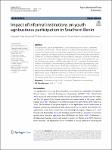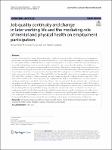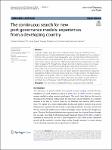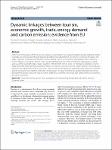Search
Author
- Marina, Dabić (3)
- Christa, Sys (2)
- Domingo, Ribeiro-Soriano (2)
- Gomez Albrecht, Maria (2)
- next >
Subject
- kinh tế (10)
- SDGs (4)
- Economic History (3)
- Economics (3)
- next >
Date issued
Has File(s)
- true (306)
Search Results
The agribusiness sector development is often portrayed as an essential component of economic development. Though Benin is a country with inestimable agricultural potential, the agribusiness sector appears unappealing to the local youths. Prior investigations diagnosed the impeding factors as a paucity of financial resource and a dearth of land and technical knowledge. This article departs from past studies by considering the importance of informal institutions for youth participation in the agribusiness sector. Exploring a rich data set of 478 youths aged 15 to 35, collected in Southern Benin based on the stratified random sampling technique, the article uses propensity score matching to address selection bias and logistic regression on the matched sample to link informal institutio... |
In times of demographic change, better job quality is needed to promote health and thereby extend employment participation among older workers. Past research has focussed on the investigation of single job quality characteristics, but neglected their combined effects on health and employment. To address this limitation, we have built upon an established typology based on nine job quality characteristics and representing five profiles of overall poor or good job quality constellations among manual and non-manual older workers, respectively. It was investigated how constant and changing job quality affects non-employment and how mental and physical health mediate this association. |
This paper bridges port governance and stakeholder theory to contribute to new understandings of changed stakeholder relations due to the building of new container terminals. The case of the newly inaugurated very large high-tech container terminal commissioned to and developed and operated by Meridian Port Services (MPS), in the Port of Tema, Ghana, provides the empirical foundation for investigating the new stakeholder engagement. Through focus groups, descriptive statistics, and a series of qualitative and open-ended interviews carried out in structured stakeholder events, the paper aims to deliver new knowledge relevant to the many hybrid port governance systems seen today. |
This research investigates the impact of R&D and innovation (R&D&I) subsidies on the innovative inputs and outputs of Polish manufacturing companies. We combine unique survey data that incorporates a representative sample of Polish manufacturing companies with data on the state aid from the State Aid Data Sharing System (SUDOP). Our results confirm the positive role of R&D&I subsidies on the likelihood of applying for a patent, filing for intellectual property protection for utility models, industrial designs, trademark registrations, and the introduction of process innovations, consistent with the existing literature. However, the results also indicate an insignificant impact of the intervention on firms’ R&D expenditures and product innovations. |
At the heart of the post-COP26 era and the European Green deal lies the underlying goals in Europe targeting climate neutrality and zero pollution through tourism developments and promotion of economic well-being of regions. This study empirically investigates the dynamic linkages among tourism developments and emission while controlling for the influence of economic growth, trade, energy demand under the framework of Panel Autoregressive Distributed Lag (PARDL) using the top 12 tourist countries in the EU from 1995 to 2018. The findings are as follows: First, the study found that trade openness negatively influences emissions. Second, economic growth, tourism, and energy use positively and significantly influence emissions. Third, energy demand positively and significantly influenc... |
This paper assesses capital mobility for a panel of 15 European countries for the period 1970–2019 using dynamic common correlated effects modeling as proposed in Chudik and Pesaran (J Econ 188(2):393–420, 2015). In particular, we account for the existence of cross section dependence, slope heterogeneity, nonstationarity and endogeneity in a multifactor error correction model (ECM) that includes one homogeneous break. The analysis also identifies the heterogeneous structural breaks affecting the relationship for each of the individual countries. |
The existing empirical literature on export promotion policies is almost exclusively focused on their effects for domestic exporters. This paper contributes to this research by empirically examining the effects of export incentives for third-country exports. Using novel CEPR Global Trade Alert data, the study investigates the impact of Brazilian, Indian and Chinese export incentives on exports of OECD and emerging countries. The findings confirm the existence of negative third-country effects of export incentives and demonstrate that these effects are expectedly larger for foreign exporters who exhibit higher similarity in geography of export with subsidized exporters. |
In this article, we examine the accuracy and bias of market valuations in the U.S. commercial real estate sector using properties included in the NCREIF Property Index (NPI) between 1997 and 2021 and assess the potential of machine learning algorithms (i.e., boosting trees) to shrink the deviations between market values and subsequent transaction prices. Under consideration of 50 covariates, we find that these deviations exhibit structured variation that boosting trees can capture and further explain, thereby increasing appraisal accuracy and eliminating structural bias. The understanding of the models is greatest for apartments and industrial properties, followed by office and retail buildings. This study is the first in the literature to extend the application of machine learning ... |
This paper examines the critical role of Mega Infrastructure Projects in sustainable urban and peripheral development by presenting a Sustainable Infrastructure Serum Analysis supported by primary field research. In the Athens Metro case study, we examined the project's impact on sustainable development by analysing the opinions of the project's users. As a result, the Athens Metro serves as a case study to help us better understand sustainable infrastructure as a framework for green growth from the standpoint of society. The three pillars of sustainable development are inextricably linked. |
We model civil litigation as a simultaneous contest between a plaintiff and a defendant who have monetary and emotional preferences. The litigants’ emotional variables capture a non-monetary joy of winning and relational emotions toward each other. A contest success function (CSF) describes the litigants’ respective probabilities of success based on their endogenous litigation expenses and exogenous relative advantages. The model does not specify a functional form for the CSF. Instead, it accommodates any CSF that satisfies general and intuitive assumptions, which capture frequently-used functional forms. A cost-shifting rule allows the winner to recover an exogenous proportion of her litigation expenses from the loser. |










